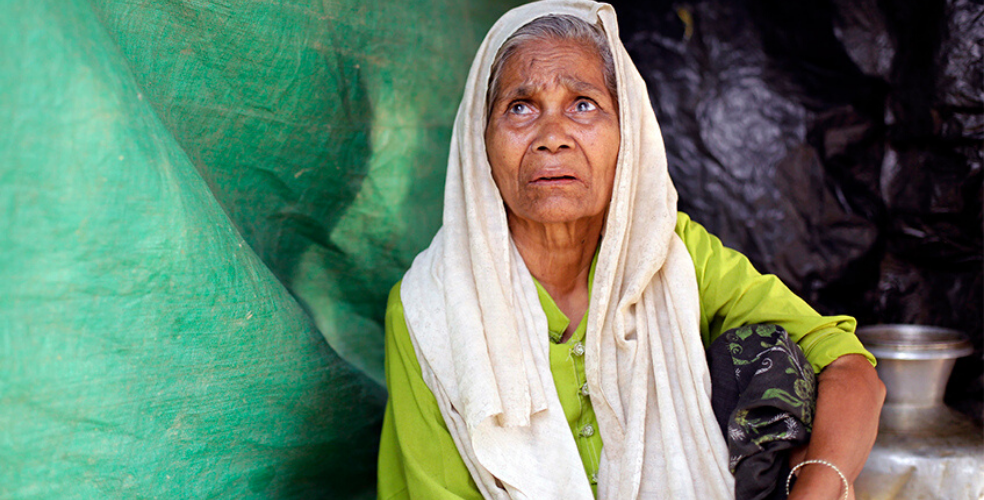World Elder Abuse Awareness Day: Neglect and abuse of older people intensified by COVID-19

Published on 15 June 2020 12:00 AM
The coronavirus pandemic has amplified the violence, abuse and neglect of older people around the world.
Before the COVID-19 crisis, it was estimated that one in six older people were subject to abuse but reports suggest that abuse has increased in many countries as a direct result of the pandemic.
Many of our partner organisations around the world are reporting a rise in the number of incidents against older people since the COVID-19 pandemic began, and several helplines have reported an increase in the number of calls from older people, predominantly women. The abuse endured by older people includes physical, financial, psychological, verbal, and sexual abuse, as well as neglect. Those at higher risk include older women, persons with disabilities and those with support needs.
In Jordan, in the first two months of lockdown Solidarity is Global Institute (SIGI) received 812 requests for urgent help (20% of which were related to domestic violence) – more than they usually receive in a whole year (about 650). However, there are concerns that the numbers reported only represent a minority of cases, as many older people are unaware of how to report such incidents or may be too scared as abuse is often perpetrated by family members they rely on.
Anecdotal evidence suggests that economic stresses caused by the COVID-19 crisis are increasing the incidence of economic abuse of older people. For example, nine crisis centres in Kyrgyzstan have received calls from older people who say that their family members are taking their pensions.
Reports suggest that domestic abuse has risen considerably as families have been forced to spend more time together due to lockdown measures. Much of this domestic abuse has been committed by family members including husbands, sons, and daughters.
"COVID-19 has caused considerable stress and anxiety for everyone, with worries about the disease itself, lockdown restrictions, lost incomes and isolation. Regrettably, the pandemic has also highlighted and exacerbated the abuse and neglect that older people were already facing.
Too often, elder abuse is kept hidden and not reported; older people may fear retribution or stigma, may not recognise what is happening to them as abuse, or national bodies may not even record abuse over a certain age.
Based on experience, we are concerned that older people will be side-lined as coronavirus continues to shape the world in 2020, despite the clear evidence that they are amongst those most at risk from this disease. It is essential that the UK government ensures that the specific needs and risks facing older people in low and middle income countries are an integral part of their global response.”
- Chris Roles, Managing Director of Age International
Age International is also receiving reports that older people are facing discrimination and struggling to access healthcare simply because of their age, whilst in some countries, healthcare professionals are choosing to prioritise younger, less at-risk, patients over older people. There are also instances of older people being refused treatment for COVID-like symptoms out of fear of contracting the virus.
For example, in Cox’s Bazar refugee camp in Bangladesh, health workers were too afraid to treat older people with seasonal flu as they thought they had COVID-19. Whilst in the DRC, at least one older person died after being taken off a ventilator to make way for another patient. Souziii took her 68-year-old grandfather to the hospital after he displayed COVID-19 symptoms. When they arrived, he was put onto a ventilator to try and stabilise his breathing. Souzi went home to get him some food and returned shortly afterwards. Souzi explained what happened next:
“About 30 minutes later, a hospital staff member took him off the ventilator as they said they needed it for someone else. There were only three ventilators in the hospital and they were in great demand. Five minutes later, my grandfather died. I reported this to the staff and one of them told me that they had to give the ventilator to a younger man who had been admitted as it is their policy to prioritise younger patients.”
Age International works with older people and communities to support them to recognise and prevent elder abuse and help them to support older people to access safety and response services. This includes providing older people with the information they need to seek support if they are experiencing abuse and access to counselling and legal advice for older survivors.
We are responding to the coronavirus pandemic in a number of countries, including DRC, Jordan, Kyrgyzstan and Cox’s Bazar in Bangladesh by raising awareness of COVID-19 and how to prevent its spread, distributing prevention kits containing essential information, hand sanitizer and soap, and providing food, medicine and other support to older people in need.
> Read the World Health Organisation's key facts on elder abuse
Read more stories from the ground
Read more of the latest news and stories on our work in combating the coronavirus in low to middle income countries.
Help us to continue supporting older people around the world
Whether with better healthcare, a secure income or life-saving aid – your gift could help change lives.
 Follow us on social media
Follow us on social media
Keep seeing our stories or ask us a question - connect on Facebook and Twitter.
